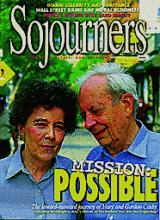IN SCOTT ROBINSON'S "Where Have all the Choirs Gone?" ("CultureWatch," September-October 1997), the author makes the same mistake that most people make when defending the conservation of all things old and traditional.
How old is old? How far back in tradition must we travel before we settle on the correct way of doing things? Why is the pipe organ such a sacred instrument? Wouldn't the lyre be much more appropriate? Wasn't "A Mighty Fortress is Our God" once a new song? (The well-informed know that the tune was a German beer drinking song before the Rev. Luther swiped it!) If Christians really want to hold on to their roots, why don't they just go to the local synagogue?
Replacing the word "contemporary" with the word "pop" isn't a fair way to dismiss this growing trend. What's wrong with electronically produced music? After all, the pipe organ was nothing more than that day's best technology synthesizing a particular sound by using air currents.
In the 1940s, parents everywhere thought their children were going to hell for listening to Tommy Dorsey. What we're seeing in this debate is the same struggle between old and new. In the end change will come, albeit grudgingly, tempered by the conservationists. Everyone will be somewhat dissatisfied with the outcome, which after all is the best indication that a compromise has taken place. A new generation will get used to this "new" way of worshiping, and in 50 years they will fight tooth and nail to conserve the integrity of "the way it should be done."
Read the Full Article
